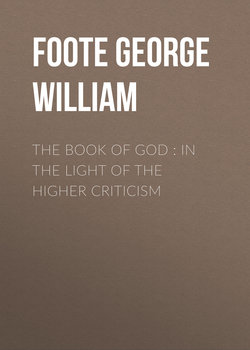The Book of God : In the Light of the Higher Criticism

Реклама. ООО «ЛитРес», ИНН: 7719571260.
Оглавление
Foote George William. The Book of God : In the Light of the Higher Criticism
I. INTRODUCTION
II. THE BIBLE CANON
III. THE BIBLE AND SCIENCE
IV. MIRACLES AND WITCHCRAFT
V. THE BIBLE AND FREETHOUGHT
VI. MORALS AND MANNERS
VII. POLITICAL AND SOCIAL PROGRESS
VIII. INSPIRATION
IX. THE TESTIMONY OF JESUS
X. THE BIBLE AND THE CHURCH OF ENGLAND
XI. AN ORIENTAL BOOK
XII. FICTITIOUS SUPREMACY
Отрывок из книги
The first chapter of Dean Farrar's book deals with the Bible Canon. After another slap at the poor benighted Christians who still hold that every word of Scripture is "supernaturally dictated and infallibly true," Dr. Farrar remarks that the Bible is "not a single nor even a homogeneous book." Strictly speaking, it is not a book, but a library; and, as is pointed out later on, it is the remains of a much larger collection which has mostly perished. The Canon of the Old Testament was "arrived at by slow and uncertain degrees." The common assertion, that it was fixed by Ezra and the so-called Great Synagogue in the fifth century before Christ, is in direct opposition to the facts. It was not really settled until seventy years after the birth of Christ, when the Rabbis met at Jamnia, and decided in favor of our present thirty-nine books. According to Dr. Farrar, there was no special influence from heaven in the determination of the Canon. It was a work which God left to "the ordinary influences of the Holy Ghost." Let us see then how these influences operated on the last and most critical occasion. "The gathering at Jamnia," says Dr. Farrar, "was a tumultuous assemblage, and in the faction fights of the Rabbinic parties blood was shed by their scholars. Hence the decision was regarded as irrevocable and sealed by blood." Such are the ordinary influences of the Holy Ghost. Its extraordinary influences may be easily imagined. Their history is written in blood and fire in every country in Christendom.
Dr. Farrar allows that the Canon of the New Testament was formed "in the same gradual and tentative way." Many Gospels, Epistles, and Apocalypses were "current" in the "first two centuries." Some of them were "quoted as sacred books" and read aloud in Christian churches. Seven, at least, of the books which are now canonical were then "disputed" – namely, the Second Epistle of St. Peter, the Second and Third Epistles of St. John, the Epistle to the Hebrews, the Epistles of St. James and St. Jude, and the Book of Revelation. The Canon was "formally and officially settled" by the Council of Laodicea (a.d. 363), and the two Councils of Carthage (a.d. 397 and 419), the decrees of which were sanctioned by the Trullian Council (a.d. 692), nearly seven hundred years after Christ. Dr. Farrar holds, however, that these Councils merely registered the general agreement of the Christian Church. The real test of canonicity is not the decision of Councils, which may and do err, but "the verifying faculty of the Christian consciousness." Dr. Farrar's argument, if it means anything at all, implies that while Councils may err, consisting as they do of fallible men, this "Christian consciousness" is really infallible. But as this Christian consciousness only exists, after all, in individual Christians, however numerous they may be, or through however many centuries they may be continued, it is difficult to see how the greatest multitude of fallibilities can make up one infallibility. And unless it can, it is also difficult to see how Dr. Farrar can have an infallible Canon. He disclaims the authority of the Church, on which Catholics rely; indeed, he says it can hardly be said that the "whole Church" has pronounced any opinion on the Canon at all. What really happened is perhaps unconsciously admitted by Dr. Farrar in a rather simple footnote. "Books were judged," he says, "by the congruity of their contents with the general Christian conviction." Precisely so; the books did not decide the doctrine, but the doctrine decided the fate of the books. And how was the doctrine decided? By fierce controversy, by forgery and sophistication, by partisan struggles, and finally, after the adhesion of Constantine, by faction fights that involved the loss of myriads (some say millions) of lives.
.....
"And it turns out that there is constantly the same sort of variation from our Gospels, a variation inexplicable in men quoting from a real Canon, and quite unlike what is found in men quoting from our Four Gospels later on. It may be said that the Old Testament, too, is often quoted loosely. True; but it is also quoted exactly; and long passages of it are thus quoted. It would be nothing that our canonical Gospels were often quoted loosely, if long passages from them, or if passages, say, of even two or three verses, were sometimes quoted exactly. But from writers before Irenæus not one such passage can be produced so quoted. And the author of Supernatural Religion by bringing all the alleged quotations forward, has proved it."1
Now what is the exact value of these demonstrations? We will give it in Mr. Arnold's words: "There is no evidence of the establishment of our Four Gospels as a Gospel-Canon, or even of their existence as they now finally stand at all, before the last quarter of the second century." Not only is there no evidence of the orthodox theory, but, as Mr. Arnold says, the "great weight of evidence is against it."
.....